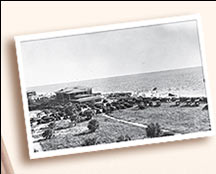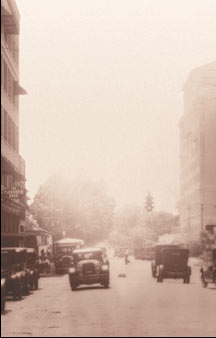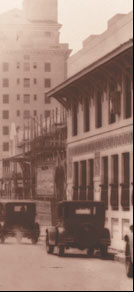 Clearwater's Early Boom Years 1920-1927
Clearwater's Early Boom Years 1920-1927
 |
The
early Florida real estate boom peaked in 1925. It soon became obvious that both
the increasing population and influx of tourists would necessitate a "great
big commercial hotel..." |
 |
 |
 |
 |
 |
| The Fort Harrison Hotel was completed at
the end of 1926, bringing to downtown Clearwater a social and cultural focal point
for the community |
|
At the end of the First World War, Americans were ready for a change. Post-war
production demands had made the economy sound, employment plentiful and credit
easy to obtain. Millions of people were suddenly purchasing cars, radios and other
modern conveniences, and enthusiastic about the promise of a new prosperity.
Automobiles had become common, as had travel in Florida. The state's population
and per capita wealth increased rapidly. At the start of 1921, the future looked
especially bright for the residents of Clearwater. The Florida real estate boom
was underway and speculators from throughout the United States arrived in the
hope of striking it rich. Some did, many did not, but many stayed on — and the
population continued to grow.
For a brief time, it appeared the boom would slow, due to one of the worst
natural disasters ever to hit the Gulf Coast: the Hurricane of '21. The storm
initially touched down in Tarpon Springs, battering nearby Clearwater with 110
mile-an-hour winds and slamming the shoreline with ten-foot tides. The winds cut
the channel known since as Hurricane Pass, nearly slicing Clearwater Island in
two.
One disaster and the threat of future hurricanes, however, could not deter
people from coming to Clearwater or to other parts of the state. The Florida real
estate boom gained momentum, reaching its peak in 1925. Clearwater, like St. Petersburg
and other coastal regions of Florida, was overrun with developers and real estate
speculators. As more and more people migrated to the city, it soon became obvious
that both the city's infrastructure and housing supply were inadequate to keep
up with the population.
It was during this time that the friends of wealthy realtor and entrepreneur
Ed Haley approached him with the idea of building a luxury hotel in the heart
of downtown. As a newspaper article of the time later reported:
"But there is one thing that Ed Haley did for Clearwater that should not go
unmentioned: he gambled more than one million dollars of his own money on his
town. During the boom, when living accommodations were at a premium, some of his
friends took him in a corner and said, 'Listen, the city's hotels are swamped.
What we need is a great big commercial hotel.'
"'All right,' said Ed Haley. So he went out and gathered on his available funds,
arranged with a hotel financing company for a loan of additional [funds] and built
the Fort Harrison. It was ahead of its time but is now coming into its own and
will stand as a monument to a citizen's enterprise."
The hotel was completed at the end of 1926, and celebrated its grand opening
by welcoming New Year 1927 in the Rooftop Restaurant with a party attended by
500 people. Prosperity had come to stay.
But as more and more tourists descended upon Clearwater, another problem developed.
In order to get to the beach, visitors and residents alike had to cross the wooden
Old Rickety Bridge, which had not fared well under the hot Florida sun or in the
salt spray of the inter-costal waterway. Drivers crossing the bridge were threatened
by a cacophony of rattles and pops as the planks that made up the wobbly structure
shook and shifted under the weight of their cars.
The solution was the beautiful Memorial Causeway Bridge. Built in 1927 at a
cost of one million dollars, the Causeway was dedicated to the heroes of World
War I. It gained state-wide publicity for Clearwater and several thousand people
attended its dedication. The new bridge served Clearwater well for the next 30
years, when it was bypassed by a new span.
Downtown was humming. It was, at times, almost impossible to get a parking
space. But with so much to see and do, people were not deterred. They bought their
bread from the Clearwater Bakery, went to the White Way Drug store for a soda
or a cigar, were served milk shakes by a curb-hop at Scranton's Arcade and watched
movies at the Ritz or Royalty theaters.
Downtown Clearwater was punctuated with gradual bursts of growth over the next
70 years, and today is once again on the upswing. Residential units currently
under construction are selling fast. A Publics Supermarket, Starbucks Coffee Shop
and other stores have opened and are catering to a new generation of people looking
for a traditional downtown experience.
Today, visitors to downtown can glimpse not only the ghost of Clearwater's
past, but, like the first boom years, the renewed promise of a very bright future.

